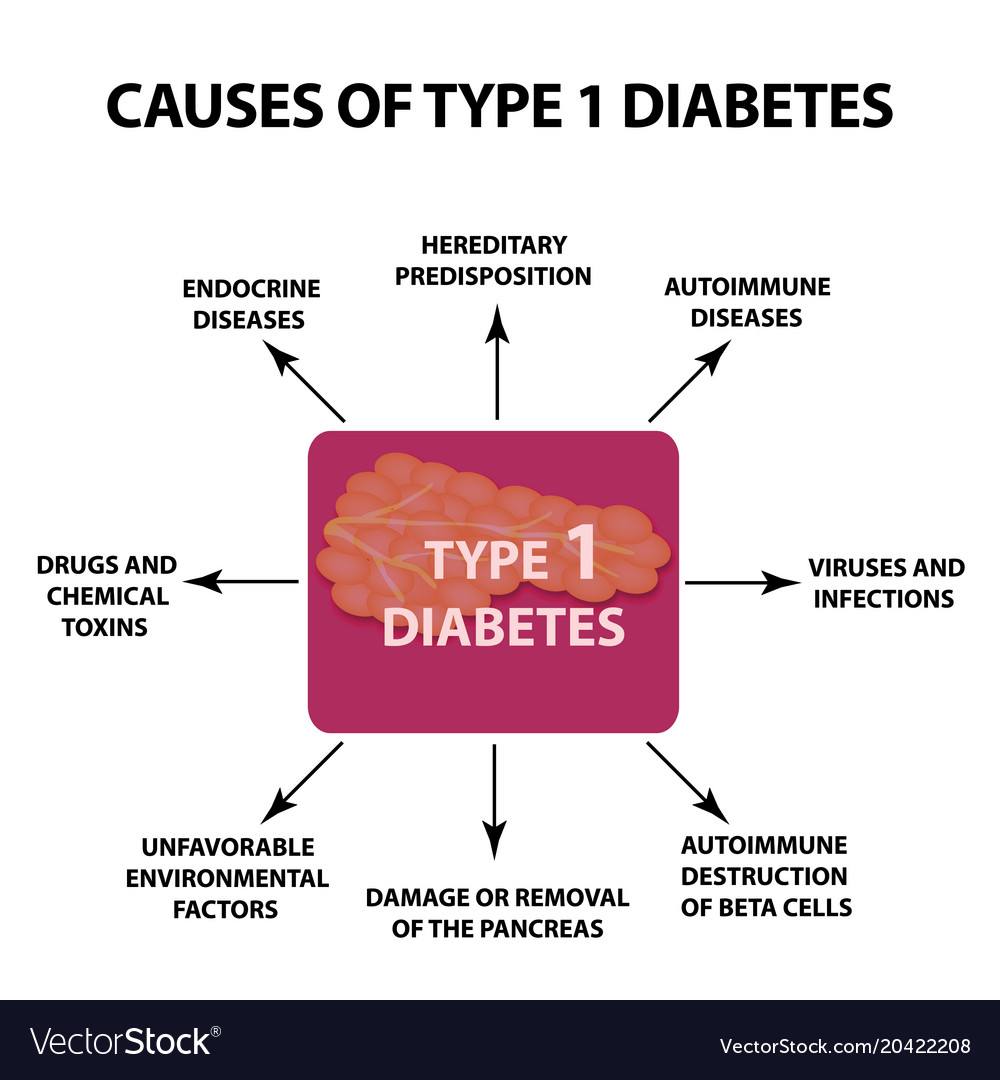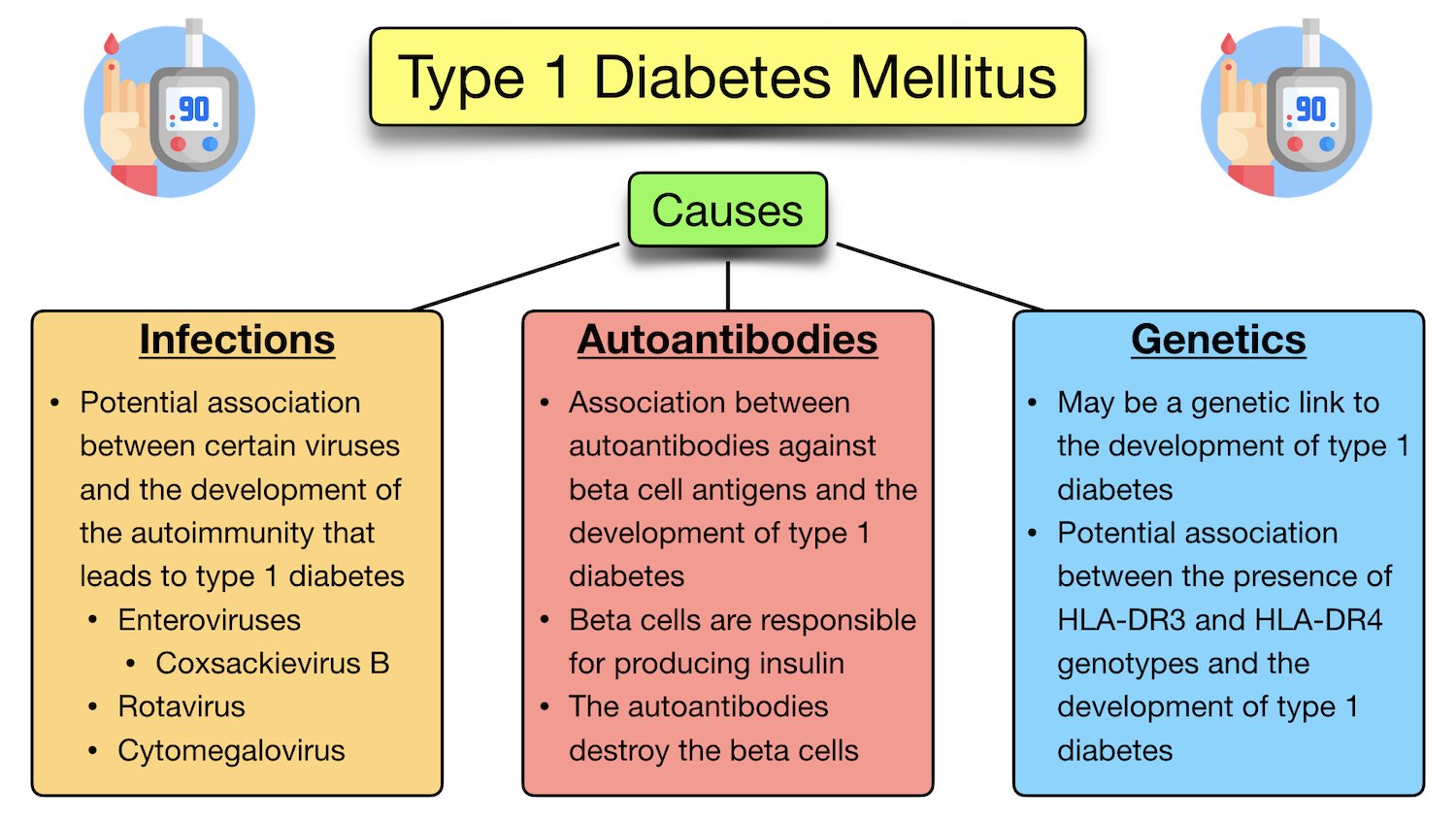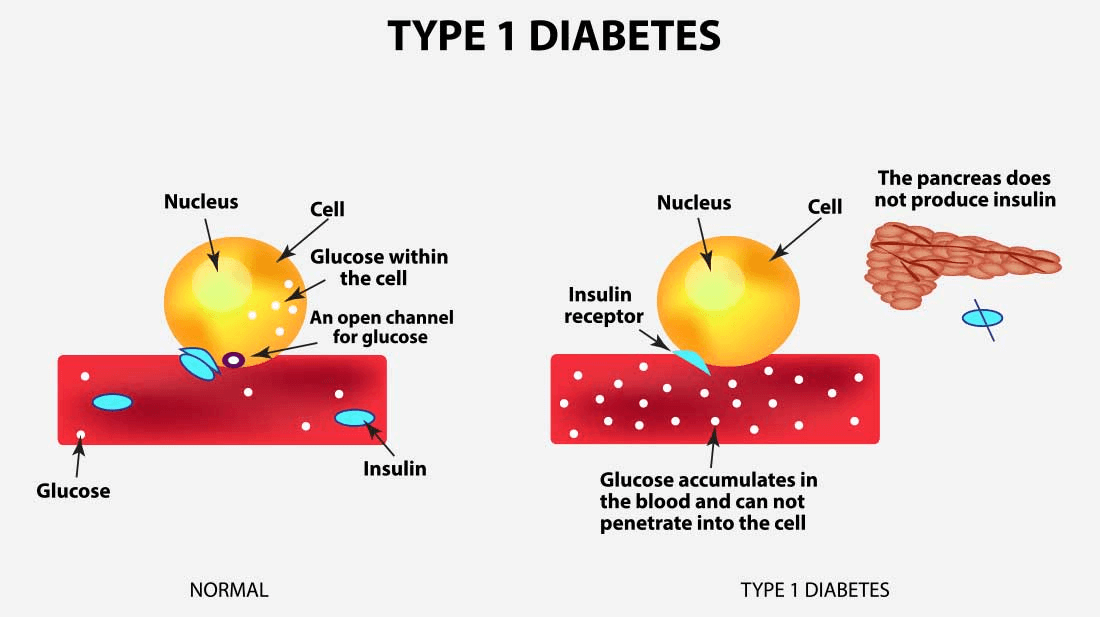What Causes Type 1 Diabetes? Getting Clear On The Roots Of This Condition
Finding out about a new health condition can feel like walking into a maze. There are so many questions, and often, the first one on people's minds is, "Why me?" or "Why did this happen?" When it comes to type 1 diabetes, this question is especially common. People often wonder what truly causes type 1 diabetes, looking for a clear reason, a single factor they can point to. It's a natural thing to want to know, to try and make sense of something that changes life so much.
For many, there is a lot of confusion around type 1 diabetes. Some people might mix it up with type 2 diabetes, which has different causes and ways of showing up. But type 1 is its own unique situation, and understanding its true origins helps clear up a lot of common misunderstandings. It is not about eating too much sugar, or about a lack of exercise, or anything you did "wrong." This condition comes about in ways that are entirely out of a person's control.
So, what really lies at the heart of type 1 diabetes? What set of events or circumstances leads to its start? We're going to talk about the main ideas that scientists and doctors have about this condition. We will look at how the body's own defense system gets involved and what other things might play a part. This way, you can get a better picture of this health matter.
Table of Contents
- What is Type 1 Diabetes?
- The Immune System's Role: An Inside Story
- Genetic Connections: Is it in Your Family Tree?
- Environmental Triggers: What Else Plays a Part?
- The "Ripple Effect" of Causes: How Things Connect
- Dispelling Myths: What Does Not Cause Type 1 Diabetes?
- Current Understanding and Ongoing Research
- Frequently Asked Questions
- Final Thoughts
What is Type 1 Diabetes?
To really get a grip on what causes type 1 diabetes, we first need to know what it is. Type 1 diabetes is a chronic health condition. It happens when the body's ability to make a very important substance, called insulin, stops working. Insulin is like a key. It lets the sugar from the food you eat, which is called glucose, get into your body's cells. These cells then use glucose for energy. Without enough insulin, glucose stays in the blood. This can lead to serious health issues over time, so it's a big deal, you know.
The pancreas is an organ that sits behind your stomach. It has special cells called beta cells. These beta cells are the ones that make insulin. In people with type 1 diabetes, these beta cells get damaged. They can no longer make insulin, or they make very little of it. This means the body cannot use glucose for energy in the way it should. That is why blood sugar levels go up.
This condition is different from type 2 diabetes. Type 2 diabetes often involves the body not using insulin well, or not making enough of it later on. Type 1 diabetes, on the other hand, means the body just stops making insulin almost completely. It is not something that develops slowly over time because of choices you make. It can appear at any age, though it often shows up in children and young adults. It is, in a way, a sudden change for the body.
- Where Do The Kalogeras Sisters Live
- Vik White
- Shawn Killinger Husband Joe Carretta
- Mike Rowe
- Madison Anderson
The Immune System's Role: An Inside Story
The main cause of type 1 diabetes involves the body's own defense system. This system, which we call the immune system, usually works to protect us. It fights off bad things like germs and viruses. But in type 1 diabetes, something goes wrong. The immune system makes a mistake. It starts to attack and destroy the beta cells in the pancreas. These are the very cells that make insulin, as we talked about. This is what people mean when they say "autoimmune condition," basically.
Think of it like this: your body's defense forces, which are usually on your side, somehow get confused. They see the beta cells as a threat, like an enemy invader. So, they launch an attack. Over time, this attack slowly wipes out more and more of these important cells. When enough beta cells are gone, the pancreas cannot make enough insulin anymore. At that point, the signs of diabetes start to show up. This process can happen over months or even years before symptoms are clear.
Scientists are still working to figure out why this mix-up happens in the first place. What makes the immune system turn on its own body parts? This is a big question in research today. It is not a simple answer, but we know for sure that the immune system's mistaken attack is the core reason for the beta cell destruction. It is, you know, a very puzzling situation for the body.
Genetic Connections: Is it in Your Family Tree?
One big piece of the puzzle about what causes type 1 diabetes comes from our genes. Genes are like instruction manuals inside our bodies. They tell our bodies how to grow and work. We get our genes from our parents. For type 1 diabetes, there is a clear link to certain genes. People who get type 1 diabetes often have certain gene types that make them more likely to get the condition. This means it can run in families, in some respects.
The genes that are most often connected to type 1 diabetes are called HLA genes. These genes play a big part in how our immune system works. They help the immune system tell the difference between what belongs in the body and what is a foreign invader. If you have certain versions of these HLA genes, your immune system might be more likely to make that mistake we talked about earlier. It might be more likely to attack the beta cells. So, having these genes means you have a higher chance of getting type 1 diabetes, but it is not a guarantee.
It is important to remember that having these genes does not mean you will definitely get type 1 diabetes. Many people have these gene types and never develop the condition. And, on the other hand, some people get type 1 diabetes without having these specific genes. This tells us that genes are a big part of the picture, but they are not the only thing. There are other factors at play, too it's almost certain. The genetic piece makes a person more open to the condition, but something else usually needs to happen for it to start.
Environmental Triggers: What Else Plays a Part?
If genes make a person more open to type 1 diabetes, then what is the "something else" that pushes it to start? This is where environmental triggers come in. These are things from the world around us that might set off the immune system's attack on the beta cells. Scientists are still trying to pin down exactly what these triggers are. They are, apparently, quite hard to identify clearly.
One common idea is that certain viruses might act as triggers. For example, some researchers think that infections with viruses like enteroviruses (which can cause colds or stomach bugs) could somehow start the autoimmune process in people who are already at risk because of their genes. The virus might cause a little damage to the beta cells, or it might just make the immune system extra active. Then, the immune system might mistakenly keep attacking the beta cells even after the virus is gone. This is just one theory, of course.
Other possible environmental triggers that scientists are looking into include certain things in our diet early in life, or even toxins in the environment. However, none of these have been proven as a single cause. It is more likely that it is a mix of things, not just one. The idea is that for someone with the right genes, one or more of these environmental events could be the spark that lights the fire, you know. It is a very complex area of study right now.
The "Ripple Effect" of Causes: How Things Connect
When we talk about what causes type 1 diabetes, it is rarely just one thing. It is more like a chain reaction, or what some might call a "ripple effect." This means that one factor does not just cause the condition directly. Instead, one thing causes a series of other things to happen. This leads to the eventual outcome of the immune system destroying the insulin-making cells. A mismatch has a ripple effect, as it were.
For instance, a person might inherit certain genes that make their immune system a bit more prone to making mistakes. This genetic openness is the first "ripple." Then, at some point, they might come into contact with an environmental trigger, like a specific virus. This virus, in a way, causes a reaction. It might make the immune system go into overdrive, or it might damage a few beta cells. This is the next "ripple" in the chain.
Because of this combination of genetic openness and an environmental trigger, the immune system starts its mistaken attack. This attack, over time, causes the beta cells to be destroyed. So, you see, it is not just one "cause" but a series of "causes" working together. It is this combination of factors that leads to the condition. There is disagreement as to the causes of the fire, as someone might say, referring to multiple reasons. Here, it is similar. It is a blend of things that have to line up just right for type 1 diabetes to show up. It is, apparently, a very particular sequence of events.
Dispelling Myths: What Does Not Cause Type 1 Diabetes?
It is really important to talk about what does not cause type 1 diabetes. There are many wrong ideas out there, and these can make people feel bad or confused. First off, eating too much sugar does not cause type 1 diabetes. This is a very common myth, but it is simply not true. While too much sugar can be a problem for other health issues, it does not make your immune system attack your pancreas. So, a diet high in sweets is not the cause, basically.
Also, lifestyle choices like not getting enough exercise do not cause type 1 diabetes. This condition is not something you can prevent by being more active or eating certain foods. It is an autoimmune condition, remember? It comes from inside the body, from the immune system's mistaken attack, not from how you live your day-to-day life. It is, quite honestly, a big difference from other health issues.
Stress does not cause type 1 diabetes either. While stress can affect your health in many ways, it does not trigger the autoimmune process that leads to this condition. There is no evidence that emotional upset or a difficult time in life can make your immune system destroy your beta cells. So, if you are feeling worried about this, you can let that go. It is not something that you can cause by worrying, or by living a certain way. The jalapenos caused my salsa to be spicy, but they would not cause type 1 diabetes, you know.
Current Understanding and Ongoing Research
Scientists are still learning more about what causes type 1 diabetes. The picture is getting clearer, but there are still many questions. Researchers around the world are working hard to find out more about the specific genes involved, the exact environmental triggers, and how these all interact. They want to know why some people with the right genes get the condition and others do not. This work is, in a way, always moving forward.
New studies are looking at things like the gut microbiome – the tiny living things in our intestines – and how they might play a part. They are also trying to find ways to spot people at risk even before they show symptoms. This could lead to ways to prevent the condition or at least slow its progress. It is a field of study that is, apparently, quite active.
The goal of all this research is to truly understand the condition from its very beginnings. This deeper knowledge could lead to new treatments, and maybe even a way to stop type 1 diabetes from happening at all. It is a long process, but every new piece of information helps. The message is the same in both phrases, that she works a lot, and here, the message is that we are still learning, you know. For more current information on type 1 diabetes research, you can look at resources from leading health organizations like the National Institute of Diabetes and Digestive and Kidney Diseases (NIDDK).
Frequently Asked Questions
What are the early signs that cause type 1 diabetes?
Type 1 diabetes itself is not "caused" by early signs. Rather, the early signs are what show up when the beta cells have already been destroyed enough to stop making insulin. These signs often include feeling very thirsty, needing to pee a lot, losing weight without trying, and feeling very tired. These are signals that your body is not handling sugar properly, and they tend to appear quite suddenly.
Is type 1 diabetes inherited from parents?
Yes, in a way, there is a genetic link. You can inherit a higher chance of getting type 1 diabetes from your parents. Certain genes, especially the HLA genes, make some people more open to the condition. But it is not a simple inheritance pattern like some other conditions. It is not a guarantee that if a parent has it, a child will get it. It just means the risk is a bit higher, you know.
Can stress cause type 1 diabetes to develop?
No, stress does not cause type 1 diabetes to develop. While stress can affect blood sugar levels in people who already have diabetes, it is not a cause of the condition itself. Type 1 diabetes is an autoimmune disease, meaning the body's own immune system attacks insulin-producing cells. This process is not triggered by stress. It is a common question, but the answer is clear on this one, basically.
Final Thoughts
So, when we ask "what causes type 1 diabetes?", we are talking about a mix of things. It is about a person's genes making them more open to the condition. And it is about environmental factors, perhaps like certain viruses, that might act as a trigger. These things together lead to the body's own immune system mistakenly attacking and destroying the cells that make insulin. It is not about anything you did or did not do, which is an important thing to remember.
Understanding this can help people feel less alone or less at fault. It is a condition that just happens. Knowing the true causes helps us move away from old myths and focus on what truly matters: living well with the condition and supporting research. We are still learning, of course, but the main ideas are clear. To learn more about diabetes management on our site, and to link to this page about type 1 diabetes, you can find more helpful information.

The causes of diabetes type 1 infographics Vector Image

Diabetes Mellitus Causes

Type 1 Diabetes: Symptom, Causes, Diagnosis & Treatment » How To Relief